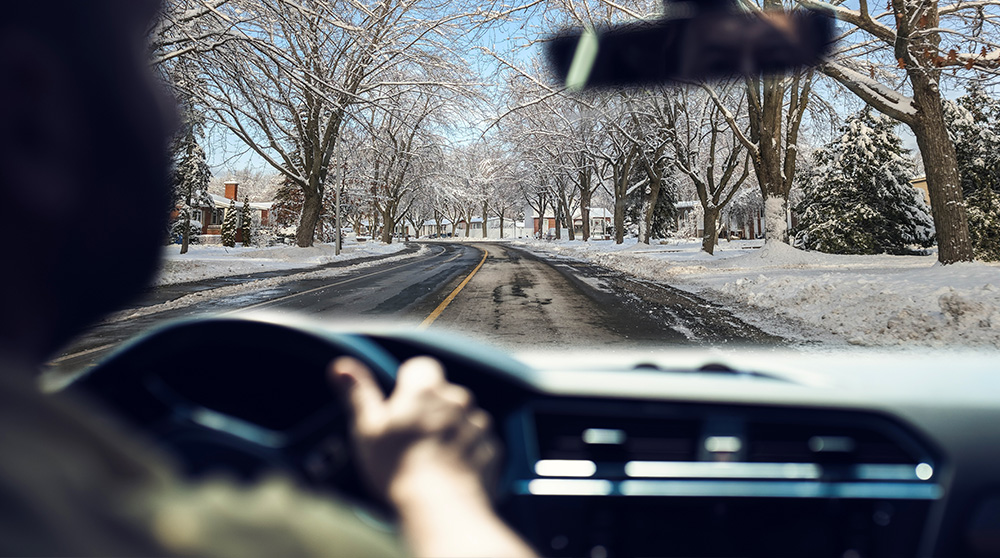Whether you’re driving across town or across state lines this holiday season, safety is key. These 19 winter road trip tips can help keep you safer in the dark, during a snowstorm, and in icy conditions.
1. Get a tune-up before traveling. Make sure your wipers, lights, tires, brakes, and battery are in good condition before departing.
2. Watch the weather report. Winter weather can sometimes be too dangerous to drive through. Know the difference between different weather alerts, such as:
- Winter weather advisories: Conditions may be hazardous but shouldn’t be life-threatening.
- Winter storm watches: Severe conditions may affect your area. These will be issued 12-36 hours before a major storm.
- Winter storm warnings: A storm bringing four or more inches of snow/sleet is expected in the next 12 hours, or six or more inches in 24 hours.
- Blizzard warnings: Snow and strong winds will produce blinding snow, deep drifts, and a life-threatening wind chill.
3. Pack an emergency kit. Keep an emergency kit in your car in case you’re stuck on the side of the road. Include things like a flashlight, first-aid kit, blanket, snacks, and these other items.
4. Travel with a charge. Make sure your cell phone is fully charged, and keep a car charger or external charger on hand. If something happens and you need to get in touch with a loved one or emergency services, you need a way to do so.
5. Get a good night’s sleep. Be totally rested before you hit the road. Drowsy driving is dangerous to both you and other drivers. If you’re too tired to drive, delay your trip or ask a loved one to take over.
6. Fuel up or charge up. Start your trip with a full tank of gas or a full charge on electric vehicles. Top off your washer fluid so your view can remain clear.
7. See and be seen. Before getting behind the wheel, scrape any snow or ice from the hood, roof, bumper, lights, windows, and windshields. This will help you see clearly and help others see you.
8. Start your GPS before you start your car. Putting an address into your GPS takes your eyes off the road for too long. Turn on your navigation and look at your first few turns before you start to drive.
9. Be aware of black ice. When the road ahead looks black and shiny, be extra cautious. Black ice is often found on shaded areas of road after the sun has come out. If you find yourself sliding over it this season, don’t hit the brakes. Lift your foot off the gas pedal and keep both hands firmly on the steering wheel.
10. Avoid cruise control. Cruise control can do more harm than good when the roads are slippery. It’s best to be in complete control of the vehicle when it’s snowing or raining.
11. Find the right speed. A good rule of thumb is to cut your normal speed in half when driving in inclement conditions.
12. Know when to watch for deer. Deer tend to be most active before sunrise and after sunset during the fall and winter seasons. If you’re driving early in the morning or late at night, be on the lookout. If you see one deer, always be alert for a second or third.
13. Give yourself enough time to stop. Keep extra distance between yourself and the vehicles around you. In bad weather, you could need anywhere between three to 12 times more space to come to a complete stop.
14. Work in extra travel time. Account for slower speeds and potential delays when planning your itinerary so you’re not stressed about getting to your destination on time.
15. Avoid nighttime drives when possible. Try to plan your trip so you arrive before 5 p.m. During winter, this is when it starts getting darker and when deer are more likely to be out. If you can adjust your trip to drive during daylight, do so.
16. Don’t drive alone. Bring someone along for the ride whenever possible. If you must get where you’re going by yourself, let someone know when you’re leaving so they know when to expect you.
17. Stop often. Make sure you’re making frequent stops to rest or rotate drivers.
18. If you get stuck, stay inside. If your car slides off the road or gets stuck, don’t exit your vehicle. Turn on your hazard lights and stay warm in your car while you wait for help.
19. Don’t share your travel plans on social media. Road tripping for the holidays? Don’t share these plans with your social networks. The more details you share on social media, the more likely someone could break into your home while you’re away.
Plan ahead, stay alert, and enjoy a safer drive with our winter road trip tips. Looking to increase your protection further? Talk to a local, independent agent about comprehensive auto insurance today.
This content was developed for general informational purposes only. While we strive to keep the information relevant and up to date, we make no guarantees or warranties regarding the completeness, accuracy, or reliability of the information, products, services, or graphics contained within the blog. The blog content is not intended to serve as professional or expert advice for your insurance needs. Contact your local, independent insurance agent for coverage advice and policy services.


